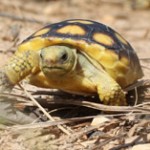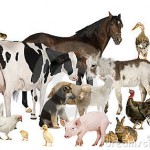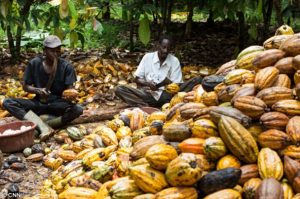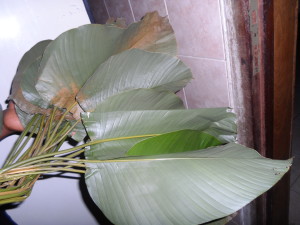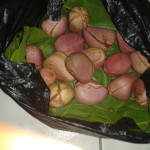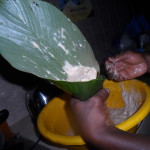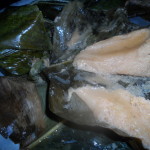Erin jẹ ẹranko ti Ọlọrun da lọ́lá pẹlu titobi rẹ ninu igbo. Yorùbá ni “Koríko ti Erin bá ti tẹ̀, àtẹ̀gbé ni láyé”, oko ti Erin bá wọ̀, olóko bẹ wọ igbèsè tori ibajẹ ti o ma ṣẹlẹ̀ si irú oko bẹ. Gbogbo ẹranko bọ̀wọ̀ fún Erin, nitori Kìnìún ọlọ́là ijù kò lè pa Erin.
Bi Erin ti tóbi tó, ni ó gọ̀ tó. Ni ọjọ́ kan, gbogbo ẹranko pe ìpàdé lati pari ìjà fún Kọ̀lọ̀kọ̀lọ̀ àti Kìnìún. Kọ̀lọ̀kọ̀lọ̀ ni bi ohun ba pa ẹran, Kìnìún a fi ògbójú gba ẹran yi jẹ. Kàkà ki Erin da ẹjọ́ pẹ̀lú òye, ṣe ló tún dá kun. Ìhàlẹ̀ àti ìgbéraga ni àwùjọ yi bi awọn ẹranko yoku ninu. O bi Kọ̀lọ̀kọ̀lọ̀ ninu to bẹ gẹ ti kò lè fọhùn. Àjàpá nikan lo dide lati fún Erin ni èsì ọ̀rọ̀, ṣùgbọ́n gbogbo ẹranko yoku bú si ẹ̀rín nitori wọn fi ojú di Àjàpá. Dipo ki Àjàpá panumọ́, ó pe erin níjà.
Ni ọjọ́ ìjà, Erin kò múra nitori ó mọ̀ pé bi Àjàpá ti kéré tó, bi ohun bá gbé ẹsẹ̀ le, ọ̀run lèrọ̀. Àjàpa mọ̀ pé ohun ko ni agbára, nitori eyi, ó dá ọgbọ́n ti yio fi bá Erin jà lai di èrò ọ̀run. Àjàpá ti pèsè, agbè mẹta pẹlu ìgbẹ́, osùn àti ẹfun ti yio dà lé Erin lóri lati dójú ti. Ó tọ́jú awọn agbè yi si ori igi nitosi ibi ti wọn ti fẹ́ jà, ó mọ̀ pé pẹ̀lú ibinu erin á jà dé idi ibi ti yio dà le lori.
Awọn ẹranko péjọ lati wòran ijà lãrin Àjàpá àti Erin. Àjàpá mọ̀ pe bi erin bá subú kò lè dide, nigbati ti ijà bẹ̀rẹ̀, ẹhin ni Àjàpá wà ti o ti nsọ òkò ọ̀rọ̀ si erin lati dá inú bi. Pẹ̀lú ibinú, ki ó tó yípadà dé ibi ti Àjàpá wa, Àjàpá a ti kósi lábẹ́, eleyi dá awọn ẹranko lára yá.
- Erin múra ìjà – Elephant charged for a fight. Courtesy: @theyorubablog
- Àjàpá – Tortoise. Courtesy: @theyorubablog
- ẹranko péjọ lati wòran ijà – animals gathered to watch a fight. Courtesy: @theyorubablog
Yorùbá ni “Bi ìyà nla ba gbeni ṣánlẹ̀, kékeré á gorí ẹni” ni ikẹhin, Àjàpá bori erin pẹ̀lú ọgbọ́n, gbogbo ẹranko gbé Àjàpá sókè pẹ̀lú ìdùnnú gun ori ibi ti erin wó si.
Ìtàn Yorùbá yi fihan pé kò si ẹni ti a lè fi ojú di. Ti a bá fẹ́ ka ìtàn yi ni ẹ̀kún rẹ́rẹ́ ni èdè Gẹẹsi, ẹ ṣe àyẹ̀wò rẹ ninu iwé “Yoruba Trickster Tales” ti Oyekan Owomoyela kọ.
ENGLISH TRANSLATION Continue reading
Originally posted 2013-10-25 17:02:09. Republished by Blog Post Promoter



